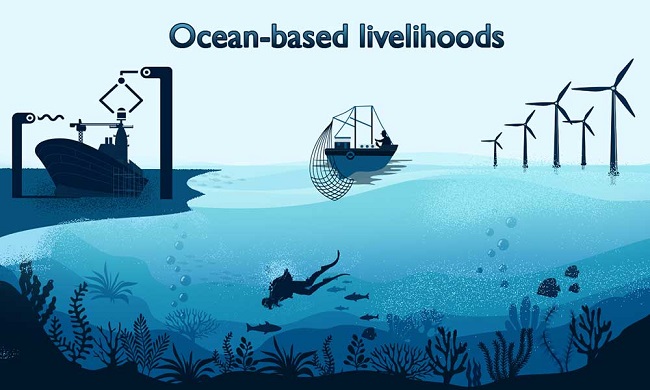Some of the replies under the recent tweets by Nigeria’s vice president, Professor Yemi Osinbajo, on the plans of government to further explore the Blue Economy, simply showed that many citizens are yet to fully grasp the importance of water bodies to the growth of a nation’s economy.

I’ve always tried to explain environmental matters in layman’s terms, and I hope that, in this piece, I can successfully break down some key areas on the subject, and also paint a clear picture of what the Nigerian government led by President Muhammadu Buhari might be looking to achieve by this latest move.
Like Osinbajo mentioned in his tweets, the term Blue Economy is basically the sustainable use of ocean resources for economic growth, improved livelihoods and jobs while preserving the health of ocean ecosystems. In other words, it is simply looking into the ocean and finding new possibilities and opportunities that can better the livelihood of those living around it.
Why the interest in Blue Economy?
First of all, it is important to note that environmental sustainability is the original goal here. To significantly reduce environmental risks while managing, protecting and preserving the earth’s water bodies now, for the sake of present and future generations.
The entire world is increasingly becoming aware of – and concerned about – the activities that take place in the environment, especially hazardous activities that are man-made. And this much attention is being paid to activities due to current bleak effects of climate change and other environmental challenges across the globe.
And so, while nations and individuals are making co-ordinated efforts in mitigating these challenges for the sake of the wellbeing of the people and the planet, there are numerous economic opportunities they could also latch on – be it on land or in the ocean. This is simply the idea behind the Green Economy and Blue Economy respectively.
What are these opportunities in water?
Just so we don’t lose the original focus, I would chip in firstly here that oceans are important carbon sinks. That is, they absorb more carbon from the atmosphere than they release. Hence, as humanity struggles to return the earth to its usual balance, the oceans need to be preserved in order to reduce the amount of carbon dioxide that goes into the atmosphere, resulting in increased heat in the environment.
But apart from mitigating climate change, the oceans, which cover approximately 70% of the surface of the planet, provide food (fishes mostly) and minerals, tackle unemployment and poverty, and serve as highways for human transport and sea-borne trade, as well as a platform for tourism.
The worldwide ocean economy is said to be valued at around $1.5 trillion per year, with about 350million jobs world-wide linked to fisheries. And it is also estimated that by 2025, around 34% of crude oil production will come from offshore fields. Aquaculture is also said to be the fastest growing food sector and provides about 50% of fish for human consumption.
These and many more reasons are why water bodies must get the needed attention, as the tampering of the coastal habitats by illegal disposal of wastes including plastics, is already affecting the quality of lives in the ocean and by extension, the health of humans who consume the resources from the ocean.
In a nutshell, the Blue Economy provides for an inclusive model in which coastal states – which sometimes lack the capacity to manage their rich ocean resources – can begin to extend the benefit of those resources to all.
So what could the Buhari government be up to?
Prof. Osinbajo at the Presidential Villa on Monday, January 17, 2022 inaugurated an expanded partnership committee on sustainable Blue Economy, a step he said was part of the administration’s move to further explore the economic opportunities available through oceanic and marine resources around the country.
Nigeria is a large nation, and practically everywhere has some body of water that can be exploited; ranging from its borders around the Gulf of Guinea in the Atlantic Ocean to the lagoons, rivers and lakes scattered around the country.
A look at the composition of Osinbajo’s committee and the ministries and agencies represented, it is obvious that the country is looking to assess its current realities, opportunities and challenges, and going on to review policies around the subject, in order to strengthen the relevant institutions for the development and prosperity of a blue economy.
Nigeria is clearly set to delve into proper coastal management, which would lead to the sustenance of the surroundings and improvement of the well-being of the people, as well as avail vast opportunities for economic growth by enhancing power generation, security, oil and gas production, transportation, fisheries, tourism and several other international trade and investment.
By Ben Ugbana
A graduate student of environmental management at the University of Lagos, Ugbana is a Lagos-based media professional and environment enthusiast
